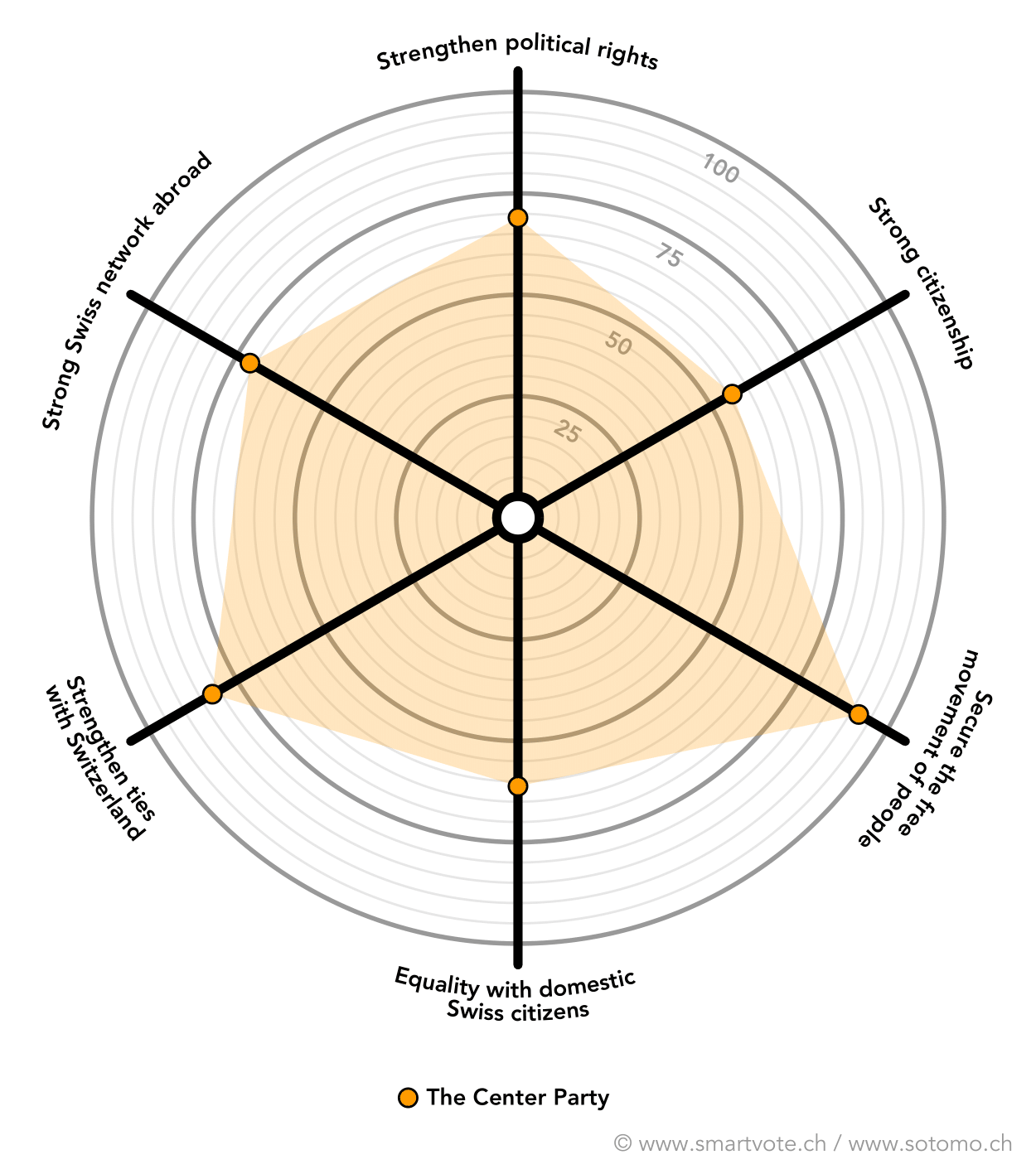
The Centre: social issues take centre stage

Swiss party The Centre is convinced that an international network is more efficient for Swiss expats to engage in Swiss political life than having a party branch abroad. The party’s deputy secretary, Maxime Marteil, explains how important social issues are to his party.
In November 2020 the former Christian Democratic Party merged with the Conservative Democratic Party and became The Centre.
Even though the party does not know the exact number of its followers around the world, Marteil notes that “changing the party’s name seems to have had a positive effect beyond our borders as the number of Swiss expats who want to be included on our party’s electoral list has risen”.
- Founding year: Established in 1912 as the Swiss Conservative Party (former National Party; Catholic parties existed in the cantons before that time)
- Predecessor party: the Christian Democratic Party merged with the Conservative Democratic Party in 2020
- Presidency: Gerhard Pfister
- Federal Council (government) posts: 1, Viola Amherd (since 2019)
- Membership: 93,500
- Proportion of seats in Federal Assembly: 17%
- 28 members in the House of Representatives
- 14 members in the Senate
- Number of women in the Federal Assembly: six women in the House of Representatives, five in the Senate (total: 26%)
- Political position – three core issues:
- Opposed to polarisation: it views itself as a balancing power between the political poles. With the slogan “We keep Switzerland together”, the party pursues solution-oriented politics and helps find “reasonable compromises” for the country.
- Supports the middle class: it fights against rising healthcare costs as more and more families struggle with increasing health insurance premiums. With its cost control initiative, the party wants to take some of the financial burden off the middle class.
- Supports married couples: it advocates against the so-called marriage penalty. Married couples must file their taxes together. They are taxed at a higher rate and receive lower state pensions than unmarried couples. The party wants to change this with two initiatives. (SRF)
With its exchange platformExternal link The Centre strives to create networks, disseminate information and motivate the Swiss Abroad to be politically active. Those who are interested have the opportunity to do this in the cantonal branches of the party.
At a national level, the party is involved in the Swiss Abroad parliamentary groupExternal link which convenes at the beginning of every parliamentary session to discuss the political initiatives on the agenda that affect Swiss citizens who live abroad. Of the 80 members of parliament in the group, 15 are members of The Centre.
Marteil says the party advocates for the Swiss Abroad to be represented in the Swiss parliament. This is already the case in France and Italy. But in order to stand for elections, he says, the Swiss Abroad must be included in the parties’ electoral lists.
For the upcoming general elections this autumn, Swiss expats can enter their names on The Centre’s “International list”.
The Centre focuses on three issues that affect the diaspora: social security, voting rights and access to the banking system.

Social security
Regarding health insurance and the pay-out of state pensions, Marteil says: “We campaign for effective social security for all Swiss nationals, no matter where they live.” It is still difficult to join the voluntary old-age pension scheme for people who live outside the European Union. “We would welcome it if these rules were relaxed.“
The Centre has launched two initiatives to change the voluntary old-age and survivors’ insurance scheme. “Yes, to fair state pensions” and “Yes, to fair taxation” are in favour of married couples and call for the abolition of discriminating criteria. The postulateExternal link of Elisabeth Schneider-Schneiter, Centre member of the House of Representative, also concerns the Swiss Abroad as it pushes for the possibility to continue to be part of the Swiss health insurance scheme, even if moving abroad.
Voting rights
“The Swiss Abroad makes up 9% of the Swiss population. This is the reality in our country, and their voices must be heard in our direct democracy,” Marteil says.
The Centre advocates for the re-introduction of e-voting, but clearly states that “safety comes before speed”. The government should implement regulations to guarantee data protection and security, so voters can build up trust in the system, he says. “A system is good only if it is used, and it will be good only if people trust it.”
The party believes that certain groups, such as the Swiss Abroad and people with disabilities, should be the first to have access to e-voting and it supports the idea that the Swiss post office should offer the e-voting system.
Reasonable access to banks
Marteil is aware that it is not easy for Swiss expats to open a bank account abroad. His party believes that the Swiss should be able to open and use a bank account at fair conditions anywhere in the world.
“Even though Filippo Lombardi’s 2017 motion External linkwas rejected, it had a positive effect and enabled the Organisation of the Swiss Abroad (OSA) to sign strategic agreements with certain banks, among other things,” Marteil explains.
Back then, Lombardi, a former member of the Senate and now president of the OSA, wanted to oblige the big banks to allow Swiss expats to open a bank account. Even though some progress was made, the party does not rule out that it would launch a similar motion.
The Centre also wants to find a durable solution for Switzerland’s relations with the European Union. “We want to continue the bilateral path which the Swiss people have voted in favour of several times.”
However, these bilateral relations should also guarantee wages and social security, he says. “The party is open to adopt certain parts of European law if it is in Switzerland’s interest.”
Cultural
The Centre believes that the media is important for the Swiss Abroad. “It is essential for forming an opinion and executing political rights. We support this kind of public service,” Marteil says. The same applies to Swiss associations abroad such as swissnex and Swiss schools. “If they are in dire financial straits, we would look into how we could support them.”
+ Successful merger: initially it was unclear whether the merger between the Christian Democratic Party and the Conservative Democratic Party would go ahead; the differences between the two parties seemed to be unsurmountable in some cantons. However, the party leadership managed to push the merger through. The mood within the party is euphoric.
+ End of downward trend: for years, the Christian Democratic Party lost seats in cantonal elections; and so did The Centre after it was formed in 2020. But this year, the party has gained seats in cantons Zurich and Basel Country, which makes them feel more confident about the upcoming national elections in autumn.
+ Presidency of the Parliamentary Investigatory Committee: with Isabelle Chassot, The Centre has filled a prestigious post which was very much sought-after by other parties. She represents canton Fribourg in the Senate and now presides the committee which investigates the collapse of Credit Suisse. (SRF)
– Mediocre performance: traditionally, The Centre’s success rate in popular votes is high, as the party usually supports either the left or the right end of the political spectrum with its votes. However, with a mere 70% of the votes, its success during the current legislative period was rather mediocre.
– Lack of unity: members of the party often have different opinions and do not vote in unity. It has happened several times that the members of the Senate have overturned the decisions of their own party members in the House of Representatives. Most recently, it happened with the vote on inflation compensation for state pensions and the envisaged procurement of containers for asylum shelters. (SRF)
Election issues and goals
Fight against rising health insurance premiums: With its own cost control initiative, The Centre wants to keep health costs down and stop the rise in health insurance premiums. The initiative calls on the government, parliament and cantons to intervene when health costs become too high.
Fight against “marriage penalty”: Married couples pay higher taxes and receive a lower state pension per capita than unmarried couples. With its two initiatives “Yes, to fair taxes“ and “Yes, to fair state pensions”, The Centre aims to fight injustice and take the financial burden off married couples.
Fight for a safe Switzerland: Against the backdrop of the war in Ukraine, The Centre has put more emphasis on security policy again. It opposes the left’s pacifism and the right’s isolationism and advocates for international cooperation in defence policy. (SRF)
Starting position and prognosis
Has the merger paid off? Does one and one equal two? Or even more? The upcoming national elections are significant for The Centre as this is the first time it is standing for elections after the merger. The elections will be a test and reveal whether the merger has been successful. The party should aim to achieve at least the same share of the votes as the two predecessor parties achieved, which would be 13.8%.
Gain ground in cities: the party’s president, Gerhard Pfister, wants to see it grow. It will be interesting to see whether the party will gain ground in urban areas where the Christian Democrats were never strong, and at the same time maintain its share of voters in its strongholds which are the Catholic cantons of Upper Valais, Fribourg and central Switzerland.
Defend strongholds in the Senate: with its 14 seats, The Centre is the strongest party in the Senate. The party must defend these seats so it can maintain its central position in Swiss politics. (Rafael von Matt, SRF)
Edited by Samuel Jaberg. Translated from German by Billi Bierling

In compliance with the JTI standards
More: SWI swissinfo.ch certified by the Journalism Trust Initiative
















![The four-metre-long painting "Sonntag der Bergbauern" [Sunday of the Mountain Farmers, 1923-24/26] had to be removed by a crane from the German Chancellery in Berlin for the exhibition in Bern.](https://www.swissinfo.ch/content/wp-content/uploads/sites/13/2025/12/01_Pressebild_KirchnerxKirchner.jpg?ver=a45b19f3)












You can find an overview of ongoing debates with our journalists here . Please join us!
If you want to start a conversation about a topic raised in this article or want to report factual errors, email us at english@swissinfo.ch.